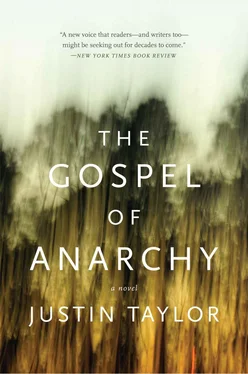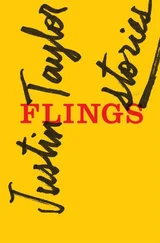Here’s Thomas, right hand wrapped tight in a vodka-soaked paper towel. He holds it in his clenched fist, fast against his bloody knuckles, which shriek with the cleansing sting and turn the towel pink. He walks out the front door. It slams behind him. Then off the porch, whose screen door is hung at a broken-elbow angle by a single distressed hinge. Then down the walk, past the orange VW (Owl, lounging inside, says, “heya, brother,” but is ignored), and out the front fence and straight into the street. He crosses the street, the planting strip, and the opposite sidewalk, then up into the yard of the house there. There are lights on in the house, but the shades are drawn, and anyway it’s not like he’s up to something. All he wants is a little perspective. He walks as close to the neighbors’ house as he dares, then turns around to face Fishgut. He’s trying to pretend that he is somebody — anybody — else.
The first thing is that it’s small. He’d forgotten that. Strange to say — after all, he lives there — but who doesn’t know that sometimes the truth is strange? With people always coming and going, and new chapters in the grand anarcho-soap of everyone’s hookups and alliances and ideologies ever being written and rewritten, it only makes sense that the place would grow outsize in his mind. Whole worlds rush up against each other in there, colliding in dark heat, or else separated by mere thin inches of concrete — not quite thin enough to punch through, as it turns out, but still, from the inside: epic. From even this minimal distance, however, this notion of magnitude is exposed for a fiction, a delusion if not an outright fraud. From the neutral zone of the across-the-road neighbors’ yard, the approximate view from these proximal strangers’ front window, you don’t see any of the things that make this place enormous to him. All you see is a small house, poorly kept up, set back on a decent piece of land — decent for in town, that is — enclosed by a chain-link fence that the twining leaves and limbs of bushes and nuisance plants have rendered basically opaque. The most visible part of the place is its low-rise roof, gravel-coated asphalt shingles dull beneath dunes of dried leaves. They gather like so much sand or snow in the valley where the main roof joins with the little one over the porch. During the day, sunlight streaming down through the oak canopy does this dappling, idyllic thing, but now, with sunset raging full bore, the trees cast long shadows eerie in their clarity on the roof faces. This only lasts a little while, magic hour, here and gone almost as soon as you realize, like Anchor poking her head out the front door, looking to see if someone is out on the porch ( you, it’s you she’s looking for ) and not finding him. She appears like a mirage in the break in the green, through the triple opening of fence gate, gaping porch mouth, and front door. So why doesn’t she see him, if he really is the one she’s after? Because even though the sight line between them is as clear and straight as a bowling lane, he’s beyond the edge of their universe, and hence not anywhere that Anchor would ever look. And now she’s turning in again — going and gone. So too the sunset. Dusk is come, the bright sky gone to lead. There’s a firefly rambling by the van now, an icky sports-drink green he can’t quite believe is natural, pulsing off-on-off, a lazy beacon adrift in smokelight.
He crosses the street again, shuts the gate behind himself. He’s home.
Thomas and Katy met through Parker, originally. This was back in ’97, when Thomas was freshly dropped out. Parker had been living in a big punk rock flophouse called the Palace of Zinn. Ah, punks and their puns. That house was a disaster. It was a bad scene. Everyone was an activist, and their various prized causes drove wedges left and right. There was a slight problem with herpes there, and a larger one with methadone. The place was run by consensus, of which there was almost none. Among all this black chaos and nihilistic disarray, it seemed that there was just enough solidarity left to unite the whole house against Parker, because he didn’t share their drugs or his body (neither took nor offered; neither gave nor received) and plus there was his spiritual tendency, which was almost certainly anti-anarchistic, they said, and anyway it wigged everyone out. They drove him from his house like Joseph Smith from Missouri. He was expelled by unanimous vote, himself abstaining.
During this same time, Parker and his new friends, Thomas and Katy, who liked him just fine and anyway thought the Palace of Zinn scene was busted beyond repair, were all regularly partying together in this warehouse squat by the train tracks that an old punk named Rooster had opened up and nicknamed — wait for it — the Coop.
Thomas knows that Parker looked up to Rooster — he’d been around , man; he was nearly forty — but he doesn’t know what Rooster thought of Parker, or of any of them, other than that it was cool if they came around to hang out as long as they brought beer along, and maybe some food. Then one day Rooster said he had decided to go hook back up with his ex, who supposedly had their two kids somewhere in Indiana. Or was it Illinois? Thomas doesn’t remember now, but it doesn’t matter. Christ, the idea of Rooster with kids! Anyway, the old bird flew the Coop, and just like that the place was theirs.
It was during this transitional moment that they met Liz. She was a scrungy kid, maybe eighteen (maybe not quite), an ACR — Alachua County Resident; a townie — who hung out at Clasen’s, the combination punk venue slash indie rec-ord store slash vegetarian burrito place that was and still is the epicenter of the local scene (now more than ever, since the Covered Dish is out of business). Thomas works off and on at Clasen’s, as a cashier slash bouncer slash sound guy — whatever the occasion happens to call for on those weeks when he happens to feel like being employed. But Liz never lived at the warehouse; she just hung out. The actual chickens in the Coop were Parker, Katy, Thomas, and a junkie named Drake, another exile from the Palace of Zinn, who had been part of the anti-Parker voting bloc, but now begged for mercy. Parker gave it to him.
Parker was raised in religion. Thomas knows that much. He ran away from home as a teenager, from some fucked sect of — what were they? Snake-handlers, Adventists, Baptists, speakers-in-tongues, Witnesses, maybe renegade Mormons; no way to be sure. He was long unchurched by the time Thomas met him, but the language, the forms of thought were stuck fast. They were who he was. Parker was a big- b Believer, he had a God-entranced vision of all things, but because of how Thomas grew up — secular atheist Jew, same as David — the very idea of belief was foreign to him, and he did not for a long time comprehend what it was he was dealing with.
Thomas fashions himself a rationalist and, increasingly, a materialist as well. He believes in direct action, at whatever order of magnitude we’re talking — from the forcible liberation of the global working class on down to some brick through a cop car window in the anonymous night. He reasons: how is the state ever going to wither away if we don’t ever get around to pulling its roots up, salting the earth in which it grows? To him, a Marxist is just an anarchist who’s forgotten the third tenet of his own revolutionary program. He learned this from Parker, who at one time was true black and red: a master thief, filthy as a snot rag, yet able to disappear completely at will. Thomas used to swear that the guy could melt into a concrete wall. He taught Thomas everything he knew about expropriation and evasion, which are other ways of saying survival (he said) — as well as how to hop trains.
Читать дальше












